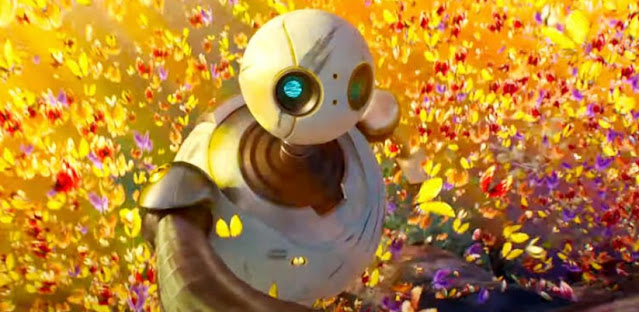I think I must have known that Chris Sanders had another movie on deck, but I guess I had forgotten it was coming out so soon. For whatever reason, when I saw his name at the end of the credits for The Wild Robot, out this weekend, I was caught off guard ... and then realized that it actually explained a lot. The basic premise felt broadly reminiscent of Lilo & Stitch, and there was at least one sequence that definitely recalled How to Train Your Dragon, both of which Sanders co-directed with Dean Deblois (executive producer on this film). With his latest offering for Dreamworks, Sanders cements his position as a titan in the world of animation.
The movie sees ROZ, a shipwrecked robot stranded on an island completely untouched by humans. One would think that such an Eden would be bereft of the squabbles that humans seem so happy to create, but the animals of the island revile this new intruder and put up every fence they have. The only thing on this rock that doesn't hate this giant metal outcast is the newly hatched gosling who imprints on her. ROZ decides that parenting is as good a directive as any, and a relationship takes root that may change more than one world.
So much of the distance travelled, for both Dreamworks specifically and computer animation as a whole, is on display with this film. You can recognize, for example, the footprints of 2000s Dreamworks cynicism in a lot of the humor early on in the film (a baby opossum is mauled offscreen, presumably eaten, only to crawl back to her family, assuring, "don't worry mom, I'm still alive!" to which mother opossum casually responds, "Oh. Yaaaaay ...") but that jadedness only ends up forming the bedrock for the film's larger treatise on rising above our natural programming and doing our part to make the world safer for one another. The film's ultimate landing place is not super obvious from the start, but when you check the math by the end, the balance comes out just the same.
Then there's animation itself. Not a frame of this movie that is anything less than jaw dropping. Long gone are the putty taxidermy days of early computer animation. Everything here looks painted rather than rendered. Even at its most hostile, you just want to let this world spill out over the canvas and wash over you. Adults too scared to see cartoons in theaters will miss out.
Gone also are the days of Dreamworks using celebrity voice talent as a crutch. I hadn't walked in with the cast list memorized. I remembered Lupita Nyong'o was the robot, and Pedro Pascal was somewhere in this bundle. But in staying through the credits and seeing I recognized almost all the names, I had that extra layer of appreciation for the performers whose star persona did not overpower the characters they were breathing life into. Special shoutout to Kit Connor as Brightbill, the gosling at the center of the story.
Anyways, we look forward to seeing Sanders at the Oscars next year, and maybe a little after that too.
--The Professor


Comments
Post a Comment